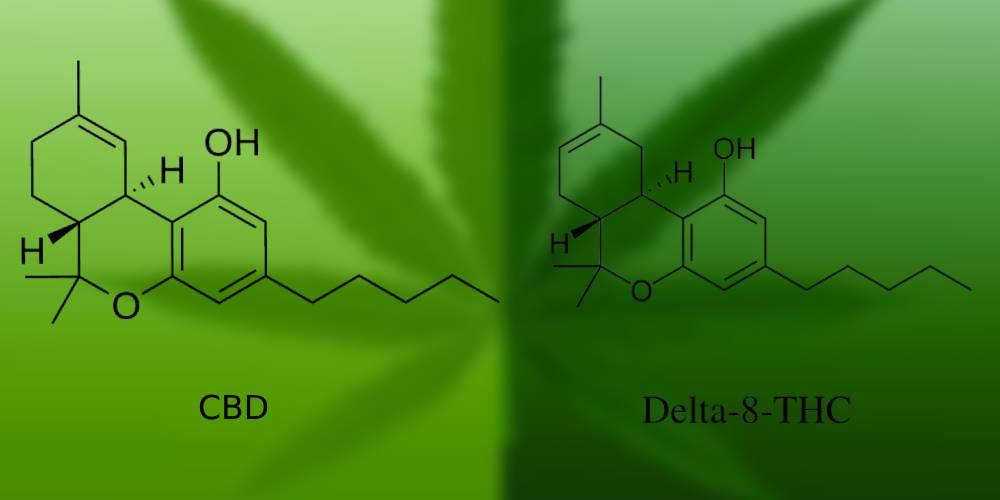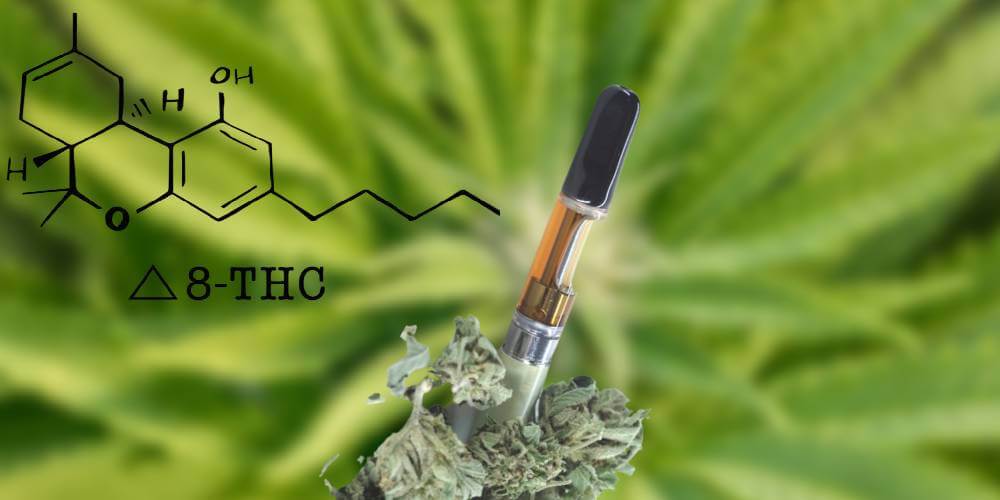Key Takeaways
- Delta-8 THC has gained popularity due to its unique properties, but its legal status varies significantly across different states and countries.
- The legality of Delta-8 THC in 2024 is shaped by a complex interplay of federal and state regulations.
- Consumers must stay informed about the evolving legal landscape of Delta-8 THC to make responsible choices.
What is Delta-8 THC?
Delta-8 THC is a cannabinoid found in trace amounts in the cannabis plant. It's similar to Delta-9 THC, the compound most commonly associated with the psychoactive effects of marijuana, but it has a slightly different chemical structure. This difference in structure leads to different effects, which many users describe as a milder, more clear-headed high. Delta-8 THC can be derived from both hemp and marijuana, though most commercial products use hemp-derived Delta-8 to comply with federal laws.
Delta-8 THC's unique properties stem from its interaction with the body's endocannabinoid system, which plays a crucial role in regulating various physiological processes. The compound is known to bind to the CB1 receptors in the brain, albeit with less potency than Delta-9 THC, resulting in a more subtle psychoactive experience. This characteristic has made Delta-8 appealing to individuals who seek the benefits of THC without the intense euphoria or potential anxiety associated with Delta-9.
Federal Regulations and Delta-8 THC
The legal status of Delta-8 THC at the federal level is murky. The 2018 Farm Bill legalized hemp and its derivatives, provided they contain less than 0.3% Delta-9 THC. While this technically includes Delta-8 THC, the DEA has expressed concerns about its legality, particularly if it's synthesized from CBD. In August 2020, the DEA released an Interim Final Rule stating that synthetically derived THC remains illegal, creating confusion and concern among producers and consumers alike.
As of 2024, there hasn't been a definitive federal ruling on Delta-8 THC, leaving it in a legal gray area. This ambiguity has led to varying interpretations and enforcement practices across states, complicating the landscape for both businesses and consumers. It's essential for anyone interested in Delta-8 products to understand the federal context and how it interacts with state laws.
Adding to the complexity, the FDA has not approved Delta-8 THC for any medical or therapeutic use, nor has it established specific regulations for its safety and efficacy. This lack of federal oversight means that the quality and consistency of Delta-8 products can vary significantly, posing potential risks to consumers. As a result, state governments and local authorities often step in to regulate or restrict the sale of Delta-8 THC products within their jurisdictions.

State-by-State Delta-8 Legality
The legality of Delta-8 THC varies significantly from state to state. Some states have explicitly legalized Delta-8 THC, while others have banned it or placed restrictions on its sale and use. The following sections explore the current status in different regions, offering a snapshot of Delta-8 legal states as of 2024.
States Where Delta-8 THC is Legal
In states where recreational marijuana is legal, Delta-8 THC often enjoys a similar status. States like California, Colorado, and Oregon have legalized Delta-8 THC, allowing it to be sold in various forms, including vapes, gummies, and tinctures. These states typically regulate Delta-8 products similarly to Delta-9 THC, requiring testing and labeling to ensure consumer safety.
In these regions, consumers have access to a wide variety of Delta-8 products, from edibles and tinctures to vape cartridges and topicals. This open market has fostered innovation, with manufacturers exploring new formulations and delivery methods to cater to diverse consumer preferences. However, the regulatory framework in these states often includes strict testing requirements to ensure product safety and prevent contamination.
States with Restrictions or Bans
Conversely, some states have taken a more restrictive approach. States like New York, Rhode Island, and Vermont have banned Delta-8 THC, citing concerns about its safety and the lack of regulatory oversight. In these states, selling, possessing, or using Delta-8 products can result in legal consequences. Other states, such as Texas and Florida, allow Delta-8 THC but have specific regulations, like age restrictions and limits on product types.
In restrictive states, Delta-8 products are often classified alongside Delta-9 THC, making their possession and sale subject to the same legal penalties. This stringent approach can create challenges for consumers and businesses alike, particularly in regions where public opinion on cannabis remains divided. As a result, the Delta-8 market in these areas is often limited, with consumers turning to online retailers or neighboring states to access these products.
States with Ambiguous or Evolving Laws
In many states, the legal status of Delta-8 THC is less clear. States like Pennsylvania and Virginia have not explicitly addressed Delta-8 in their legislation, leading to a gray market where products may be sold without clear legal guidance. In these states, the legal landscape can change rapidly, as lawmakers and regulators work to catch up with the evolving cannabis market.
In such states, the lack of clear regulations can lead to confusion among consumers and businesses. This ambiguity often results in inconsistent enforcement practices, where Delta-8 products may be available in some areas but restricted in others. Consumers in these regions should exercise caution and stay informed about local laws and any potential changes that may affect their access to Delta-8 products.
Evolving Delta-8 Regulations in 2024
The legal landscape for Delta-8 THC is constantly evolving. In 2024, several states are considering new legislation or regulatory changes that could impact the availability and legality of Delta-8 products. For example, some states are exploring stricter testing and labeling requirements, while others are debating outright bans.
One notable trend is the increasing scrutiny of Delta-8 products by regulatory bodies. As the market grows, there are concerns about product quality and safety, particularly in the absence of comprehensive federal regulations. Some states are taking proactive steps to regulate Delta-8 THC, implementing testing protocols to ensure products are free from contaminants and accurately labeled.
In response to these regulatory challenges, some industry players are advocating for clearer and more consistent regulations at both the state and federal levels. This push for uniform standards aims to create a safer and more transparent market for consumers, while also providing businesses with a clear framework to operate within. As the legal landscape continues to evolve, it's crucial for stakeholders to stay engaged with the legislative process and advocate for responsible regulation.
Delta-8 and the Law: What Consumers Need to Know
For consumers, navigating the legal landscape of Delta-8 THC can be challenging. It's crucial to stay informed about the laws in your state and any potential changes that may impact your ability to purchase and use Delta-8 products. Here are some key considerations for consumers in 2024:
- Check Local Laws: Before purchasing Delta-8 products, research the laws in your state or locality. Laws can vary widely, and what is legal in one area may be prohibited in another.
- Purchase from Reputable Sources: Given the lack of federal regulation, it's essential to buy Delta-8 products from reputable companies that provide lab reports and quality assurance.
- Stay Updated: The legal status of Delta-8 THC is subject to change. Keep an eye on news and updates from reliable sources to stay informed about any new regulations or legal developments.
Consumers should also be aware of potential legal risks associated with Delta-8 THC, particularly when traveling across state lines. While Delta-8 may be legal in one state, it could be considered illegal in another, leading to potential legal consequences. It's essential to understand the laws in both your home state and any states you plan to visit to avoid legal complications.

The Future of Delta-8 THC
As we move further into 2024, the future of Delta-8 THC remains uncertain. The compound's popularity shows no signs of waning, but its legal status will likely continue to evolve. In some states, we may see more stringent regulations or even bans, while others may embrace Delta-8 as part of their broader cannabis markets.
One factor that could significantly impact the future of Delta-8 THC is federal regulation. If the federal government clarifies its stance on Delta-8, it could either open the door to broader acceptance or lead to stricter enforcement against the compound. For now, the legal landscape remains a complex and ever-changing field that requires careful navigation by consumers and businesses alike.
Another potential development is the growth of research and public awareness surrounding Delta-8 THC. As more studies are conducted and the public becomes more informed about this cannabinoid, we may see shifts in public perception and regulatory approaches. This evolving understanding could lead to more nuanced and informed regulations that balance consumer safety with access to Delta-8 products.
Delta-8 Vapes and Gummies: Popular Products in 2024
Delta-8 THC products come in various forms, with vapes and gummies being among the most popular. Delta-8 vapes offer a convenient and fast-acting way to experience the effects of the compound, with a wide range of flavors and potency levels available. Meanwhile, Delta-8 gummies provide a more controlled and discreet option, often appealing to those new to cannabis or looking for a milder experience.
Both vapes and gummies are subject to the same legal considerations as other Delta-8 products. It's essential to ensure that these products are purchased from reputable sources and that they comply with local laws and regulations. As the market for Delta-8 THC continues to grow, consumers can expect an increasing variety of products, each with its own set of benefits and considerations.
In addition to vapes and gummies, Delta-8 THC is available in other forms such as tinctures, capsules, and edibles. Each product type offers different advantages and considerations, depending on the user's preferences and needs. For instance, tinctures provide a flexible dosing option, while edibles offer a longer-lasting effect. Consumers should carefully consider their options and choose the product that best aligns with their lifestyle and desired experience.
Conclusion
The legal landscape of Delta-8 THC in 2024 is a complex and evolving topic. As this compound gains popularity, it is essential for consumers and businesses to stay informed about the laws and regulations that govern its use. By understanding the current legal status, potential changes, and key considerations, individuals can make informed choices about Delta-8 products.
In a world where cannabis laws are continually shifting, staying up-to-date on the latest developments is crucial. Whether you're a seasoned cannabis user or new to the scene, navigating the legal landscape of Delta-8 THC requires diligence and awareness. As we look to the future, one thing is certain: the story of Delta-8 THC is far from over, and its legal journey will continue to unfold in the coming years.
As the Delta-8 market continues to evolve, consumers and businesses alike must remain vigilant and proactive. Staying informed about changes in the legal landscape, understanding the nuances of state and federal regulations, and prioritizing product quality and safety are essential steps for navigating this complex and dynamic market. With the right knowledge and approach, individuals can enjoy the benefits of Delta-8 THC while staying within the bounds of the law.
FAQs
1. Is Delta-8 THC legal in all states?
No, Delta-8 THC is not legal in all states. Some states have explicitly legalized it, while others have banned it or imposed restrictions. It's essential to check the laws in your specific state before purchasing or using Delta-8 products.
2. Can Delta-8 THC be shipped across state lines?
Shipping Delta-8 THC across state lines can be legally complicated. While some states allow it, others have restrictions or bans in place. It's crucial to be aware of the laws in both the shipping and receiving states to avoid legal issues.
3. How can I ensure the quality of Delta-8 products?
To ensure the quality of Delta-8 products, purchase from reputable companies that provide lab reports and transparency about their sourcing and manufacturing processes. Look for third-party testing to verify the product's potency and purity.



